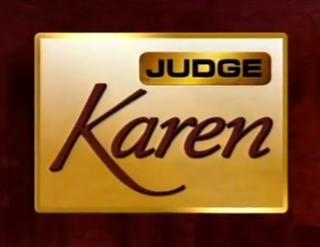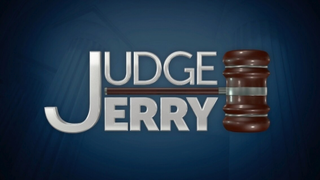
Judge Judy is an American arbitration-based reality court show presided over by former Manhattan Family Court Judge Judith Sheindlin. The show featured Sheindlin as she adjudicated real-life small-claims disputes within a simulated courtroom set. Prior to the proceedings, all involved parties signed arbitration contracts agreeing to Sheindlin's ruling. The show aired in first-run syndication. As it was during its active years in production, it continues to be distributed by CBS Media Ventures in syndication, now in reruns that still draw notably high ratings.

Judge Mathis is an American arbitration-based reality court show presided over by Judge Greg Mathis, a former judge of Michigan's 36th District Court and Black-interests motivational speaker/activist.

The People's Court is an American arbitration-based reality court show, featuring an arbitrator handling small claims disputes in a simulated courtroom set. Within the court show genre, it is the first of all arbitration-based reality-style programs, which has overwhelmingly become the convention of the genre. The original series ran from 1981 to 1993, and the revival ran from 1997 to 2023. Both versions have run in first-run syndication. The show ranks as the longest-running traditional court show and second-longest-running court show in general, having a total of 38 overall seasons as of the 2022–23 television year, behind only niche court show Divorce Court by 2 seasons.

Divorce Court is an American court show that revolves around settling the disputes of couples going through divorces. The show has had four separate runs, all in first-run syndication. Since the debut of the original series in 1957, it is one of the longest-running syndicated television programs of all time. Divorce Court also holds the record for the longest-running court show of all time, leading the second-place show The People's Court by two years.

Judge Joe Brown is an American arbitration-based reality court show starring former Shelby County, Tennessee criminal court judge Joseph B. Brown. The series premiered on September 14, 1998 and ran through the 2012–13 television season for a total of fifteen seasons. Joe Brown was the second highest paid daytime television personality behind Judge Judy during the time the show was running.
Moral Court is a syndicated nontraditional court show hosted by Larry Elder, that aired in the 2000-01 television season.
Petri Hawkins-Byrd, better known as Bailiff Byrd or simply Byrd, is an American court show bailiff, television personality, social media personality, actor, voice actor, writer, and former New York State Court Officer.

Akim A. Anastopoulo is an American lawyer and television personality. He was the judge on National Lampoon's syndicated court show, Eye for an Eye, from 2003 through 2009, known as "Judge Extreme Akim." The nickname was derived from his bizarre and draconian forms of punishment on the program. He runs a law firm in South Carolina, Anastopoulo Law Firm.
The Judge is a dramatized court show which ran in first-run syndication from 1986 to 1993. The series chronicled family court cases heard by Judge Robert J. Franklin, played by Bob Shield.
Jury Duty is an American syndicated nontraditional/arbitration-based reality court show that premiered on September 17, 2007. Initial market clearances, according to Broadcasting & Cable, were at least 60 percent of the nation's television markets. The show was produced and distributed by Radar Entertainment.

Judge Karen is an American arbitration-based reality court show that aired in first-run syndication and ran for one season, during the 2008–09 television period. The series debuted on September 8, 2008, in 48 of the top 50 U.S. markets.
Judge Jeanine Pirro is an American arbitration-based reality court show, presided over by retired Westchester County, New York, District Attorney Jeanine Pirro. The series debuted on The CW on September 22, 2008 and ended in May 2011.

Mablean Deloris Ephriam, Esq. is an American television personality and former Los Angeles prosecuting attorney. She is best known as the adjudicator of the courtroom series Divorce Court for seven seasons from 1999 to 2006. She was replaced by Judge Lynn Toler in the show's 2006-07 season. Ephriam is also known for her judge roles in Tyler Perry's Madea films.
Judge David Young is an American arbitration-based reality court show presided over by former Miami-Dade County Circuit Court Judge David Young. The series aired in first-run syndication. It premiered on television stations across the United States and Canada on September 10, 2007, and ran for 2 seasons until September 4, 2009.
A court show is a broadcast programming subgenre comprising legal dramas and reality legal programming. Court shows present content mainly in the form of legal hearings between plaintiffs and defendants presided over in one of two formats: scripted/improvised with an actor portraying a judge; or an arbitration-based reality format with the case handled by an adjudicator who was formerly a judge or attorney.

Lauren Lake's Paternity Court is a nontraditional court show in which family lawyer and legal analyst Lauren Lake heard and ruled on paternity cases and rendered DNA test results.
Jones & Jury is an American nontraditional arbitration-based reality court show presided over by former Brooklyn Prosecutor and District Attorney Star Jones.

Judge Jerry is an American arbitration-based reality court show which was presided over by Jerry Springer, who previously hosted Jerry Springer from 1991 to 2018. The series began its run in first-run syndication on September 9, 2019, and was distributed by NBCUniversal Syndication Studios.

Judy Justice is an American arbitration-based reality court show presided over by former Manhattan Family Court Judge Judith Sheindlin. Judy Justice is both a spin-off and continuation of courtroom series Judge Judy (1996–2021). The show features Sheindlin adjudicating real-life small-claims disputes within a simulated courtroom set. Prior to the proceedings, all involved parties sign arbitration contracts agreeing to Sheindlin's ruling.

Judge Steve Harvey is an American arbitration-based reality court comedy show hosted by Steve Harvey. The series premiered on ABC on January 4, 2022. Unlike most courtroom programming which airs in the daytime television bracket, Judge Steve Harvey airs in prime time. Also in contrast to most courtroom programming, which typically airs a new episode for each weekday, Judge Steve Harvey takes the approach of a sitcom television schedule, airing one new episode per week.











